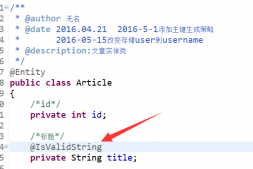java 中ThreadLocal 的正确用法
用法一:在关联数据类中创建private static ThreadLocalThreaLocal的JDK文档中说明:ThreadLocal instances are typically private static fields in classes that wish to associate state with a thread。如果我们希望通过某个类将状态(例如用户ID、事务ID)与线程关联起来,那么通常在这个类中定义private static类型的ThreadLocal 实例。
例如,在下面的类中,私有静态 ThreadLocal 实例(serialNum)为调用该类的静态 SerialNum.get() 方法的每个线程维护了一个“序列号”,该方法将返回当前线程的序列号。(线程的序列号是在第一次调用 SerialNum.get() 时分配的,并在后续调用中不会更改。)
|
1
2
3
4
5
6
7
8
9
10
11
12
13
14
|
public class SerialNum { // The next serial number to be assigned private static int nextSerialNum = 0; private static ThreadLocal serialNum = new ThreadLocal() { protected synchronized Object initialValue() { return new Integer(nextSerialNum++); } }; public static int get() { return ((Integer) (serialNum.get())).intValue(); } } |
【例】
|
1
2
3
4
5
6
7
8
9
10
11
12
13
14
15
16
17
18
19
20
21
22
23
24
25
26
27
28
29
30
|
public class ThreadContext { private String userId; private Long transactionId; private static ThreadLocal threadLocal = new ThreadLocal(){ @Override protected ThreadContext initialValue() { return new ThreadContext(); } }; public static ThreadContext get() { return threadLocal.get(); } public String getUserId() { return userId; } public void setUserId(String userId) { this.userId = userId; } public Long getTransactionId() { return transactionId; } public void setTransactionId(Long transactionId) { this.transactionId = transactionId; } } |
用法二:在Util类中创建ThreadLocal
这是上面用法的扩展,即把ThreadLocal的创建放到工具类中。
【例】例如hibernate的工具类:
|
1
2
3
4
5
6
7
8
9
10
11
12
13
14
15
16
17
18
19
20
21
22
23
24
25
26
27
28
29
30
31
32
33
34
35
36
37
38
39
40
|
public class HibernateUtil { private static Log log = LogFactory.getLog(HibernateUtil.class); private static final SessionFactory sessionFactory; //定义SessionFactory static { try { // 通过默认配置文件hibernate.cfg.xml创建SessionFactory sessionFactory = new Configuration().configure().buildSessionFactory(); } catch (Throwable ex) { log.error("初始化SessionFactory失败!", ex); throw new ExceptionInInitializerError(ex); } } //创建线程局部变量session,用来保存Hibernate的Session public static final ThreadLocal session = new ThreadLocal(); /** * 获取当前线程中的Session * @return Session * @throws HibernateException */ public static Session currentSession() throws HibernateException { Session s = (Session) session.get(); // 如果Session还没有打开,则新开一个Session if (s == null) { s = sessionFactory.openSession(); session.set(s); //将新开的Session保存到线程局部变量中 } return s; } public static void closeSession() throws HibernateException { //获取线程局部变量,并强制转换为Session类型 Session s = (Session) session.get(); session.set(null); if (s != null) s.close(); }} |
用法三:在Runnable中创建ThreadLocal
还有一种用法是在线程类内部创建ThreadLocal,基本步骤如下:
1、在多线程的类(如ThreadDemo类)中,创建一个ThreadLocal对象threadXxx,用来保存线程间需要隔离处理的对象xxx。
2、在ThreadDemo类中,创建一个获取要隔离访问的数据的方法getXxx(),在方法中判断,若ThreadLocal对象为null时候,应该new()一个隔离访问类型的对象,并强制转换为要应用的类型。
3、在ThreadDemo类的run()方法中,通过调用getXxx()方法获取要操作的数据,这样可以保证每个线程对应一个数据对象,在任何时刻都操作的是这个对象。
|
1
2
3
4
5
6
7
8
9
10
11
12
13
14
15
16
17
18
19
20
21
22
23
24
25
26
27
28
29
30
31
32
33
34
35
36
37
38
39
40
41
42
43
44
45
46
47
48
49
50
51
52
|
public class ThreadLocalTest implements Runnable{ ThreadLocal<Studen> studenThreadLocal = new ThreadLocal<Studen>(); @Override public void run() { String currentThreadName = Thread.currentThread().getName(); System.out.println(currentThreadName + " is running..."); Random random = new Random(); int age = random.nextInt(100); System.out.println(currentThreadName + " is set age: " + age); Studen studen = getStudent(); //通过这个方法,为每个线程都独立的new一个student对象,每个线程的的student对象都可以设置不同的值 studen.setAge(age); System.out.println(currentThreadName + " is first get age: " + studen.getAge()); try { Thread.sleep(500); } catch (InterruptedException e) { e.printStackTrace(); } System.out.println( currentThreadName + " is second get age: " + studen.getAge()); } private Studen getStudent() { Studen studen = studenThreadLocal.get(); if (null == studen) { studen = new Studen(); studenThreadLocal.set(studen); } return studen; } public static void main(String[] args) { ThreadLocalTest t = new ThreadLocalTest(); Thread t1 = new Thread(t,"Thread A"); Thread t2 = new Thread(t,"Thread B"); t1.start(); t2.start(); } }class Studen{ int age; public int getAge() { return age; } public void setAge(int age) { this.age = age; } } |
感谢阅读,希望能帮助到大家,谢谢大家对本站的支持!
原文链接:http://blog.csdn.net/vking_wang/article/details/14225379

















